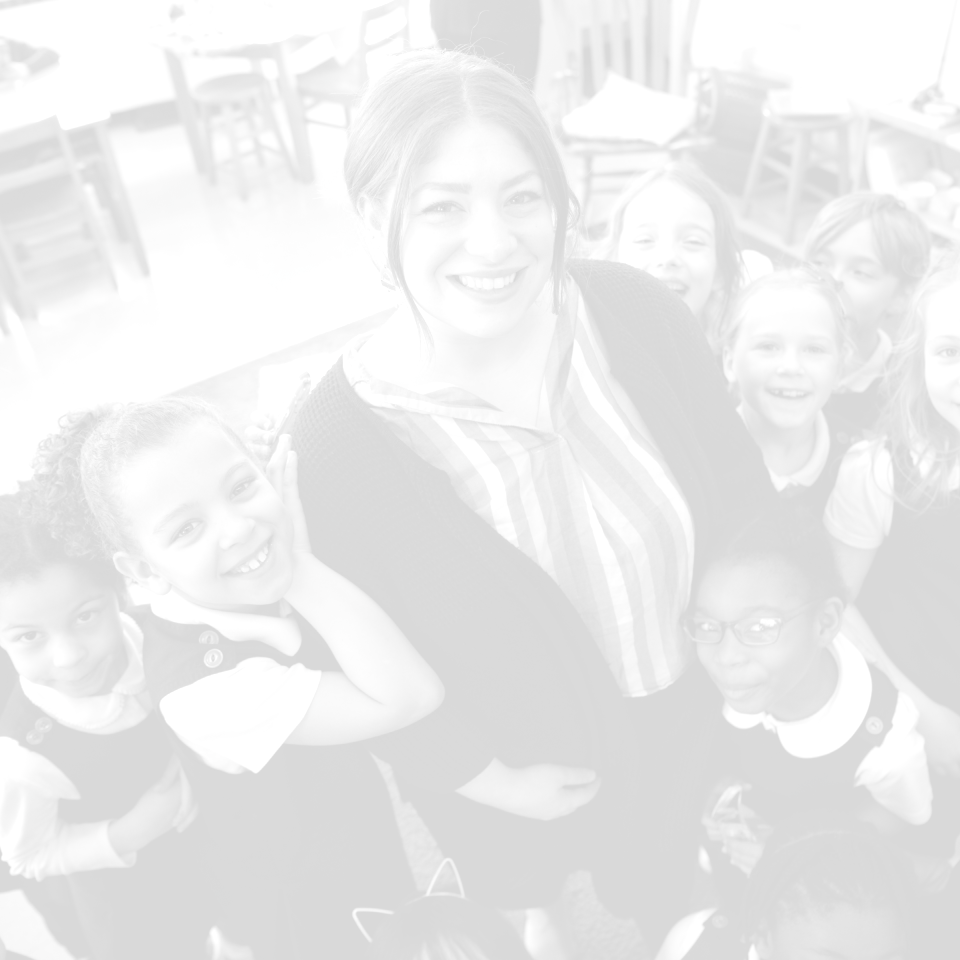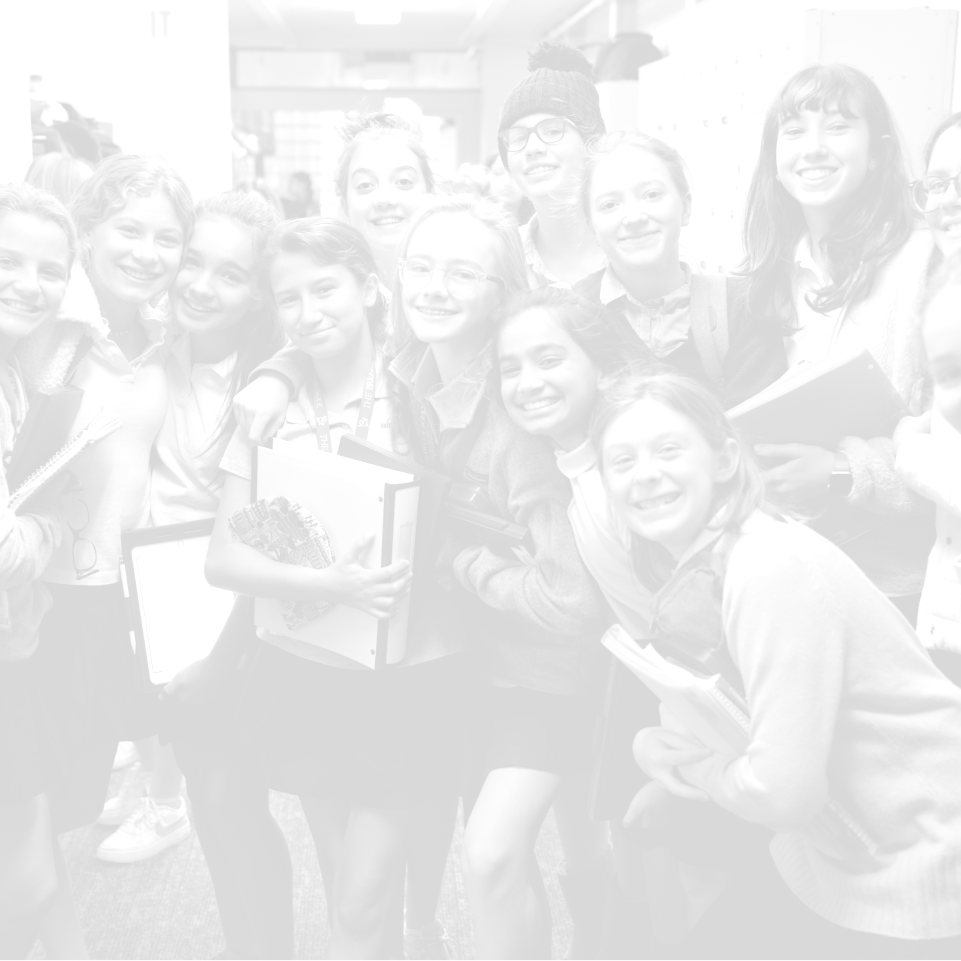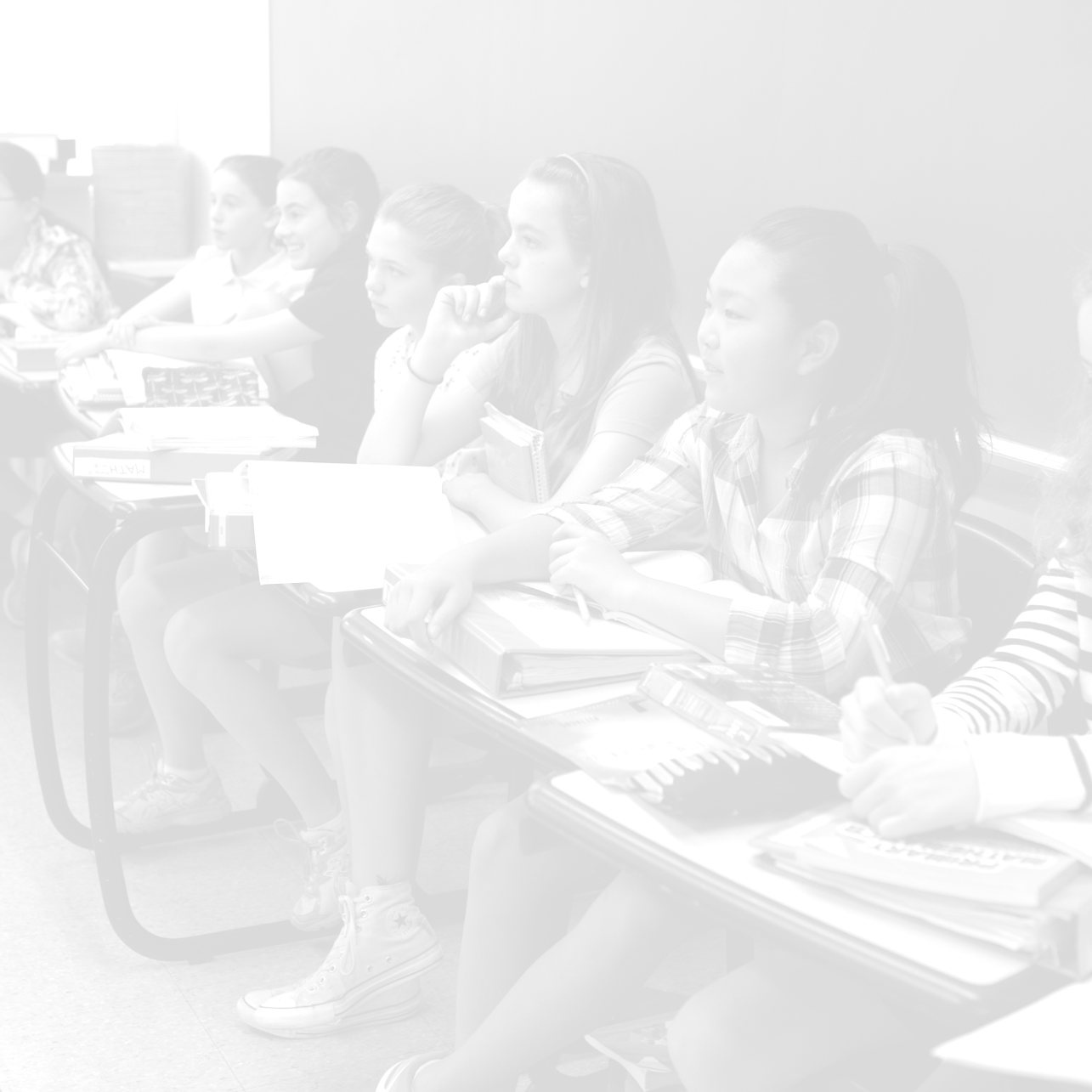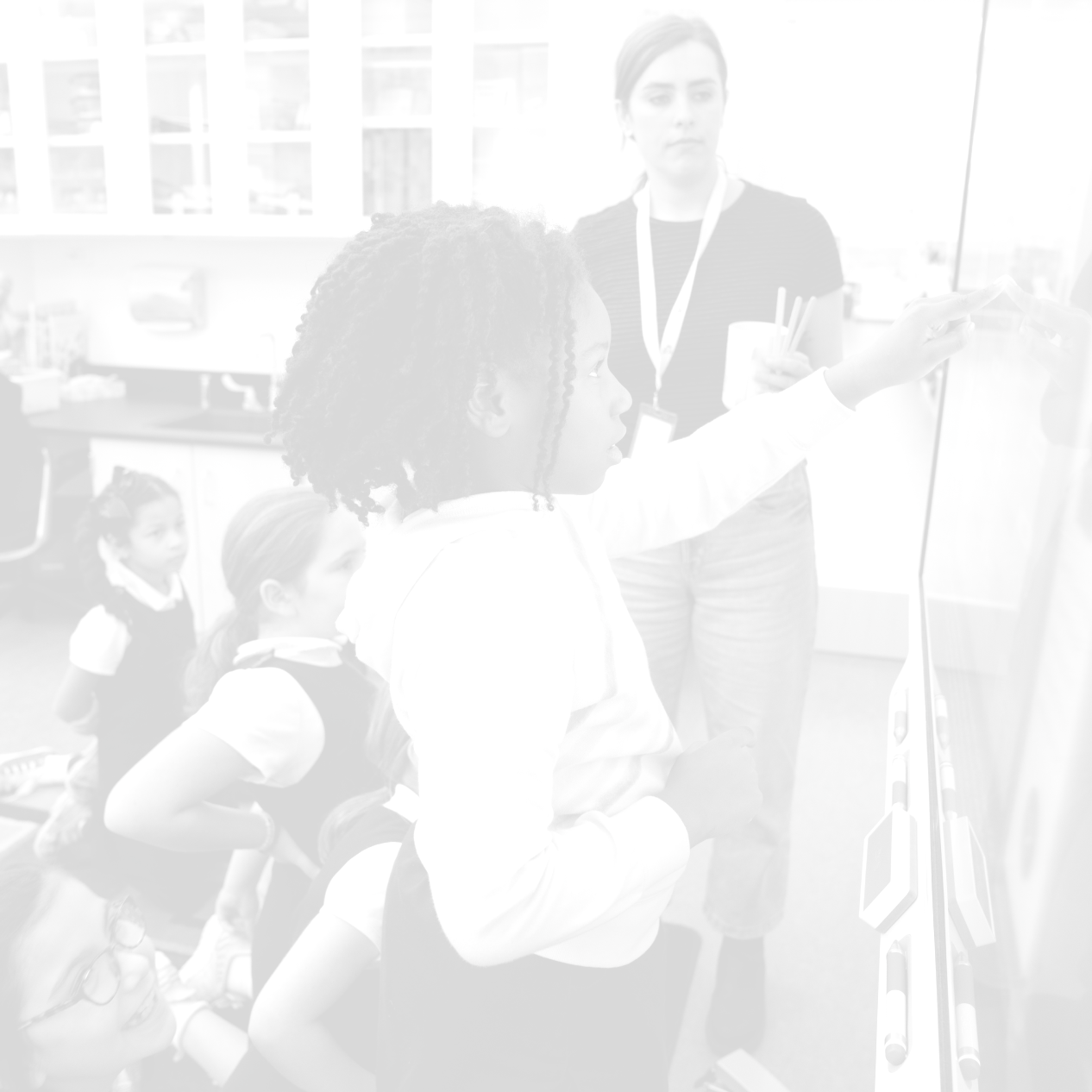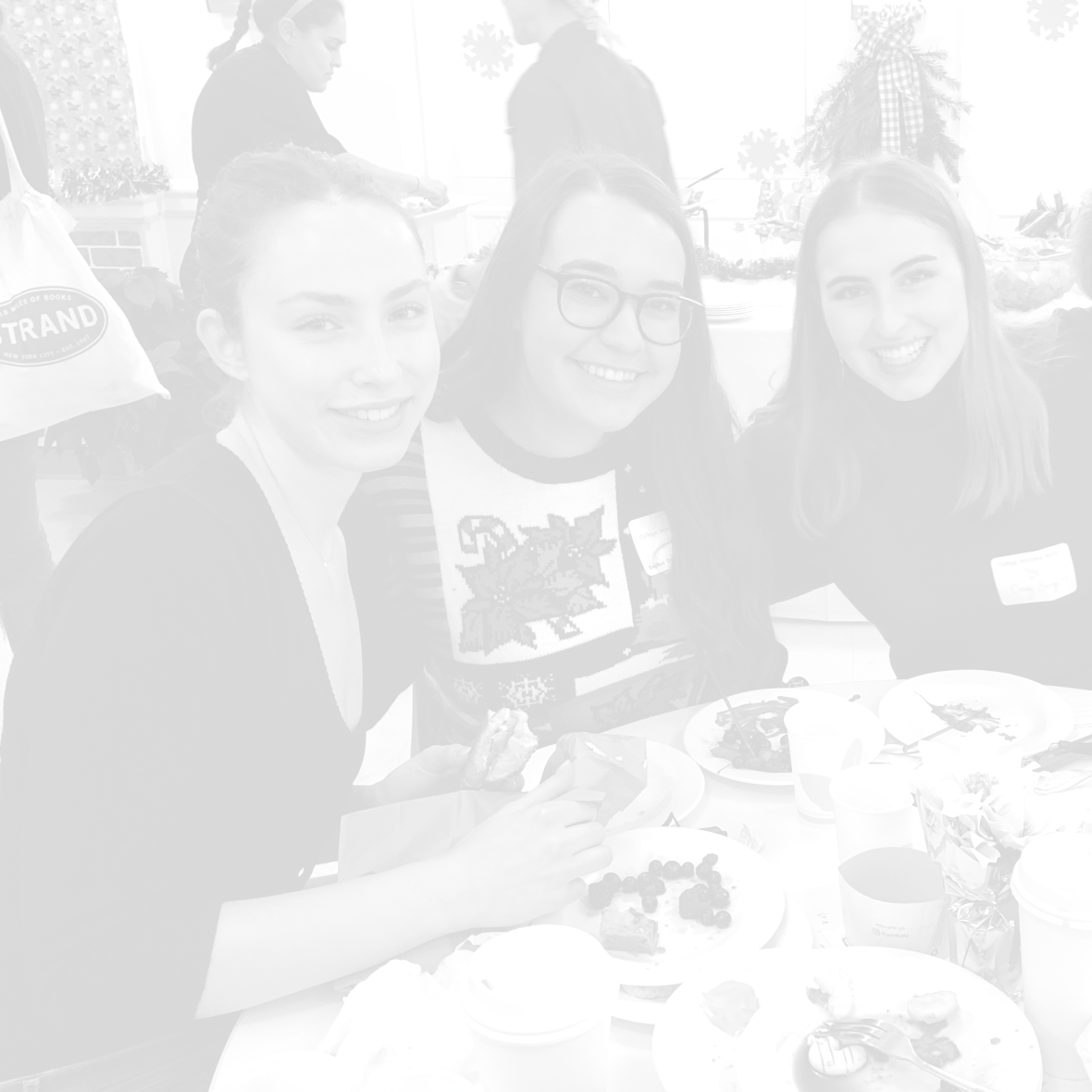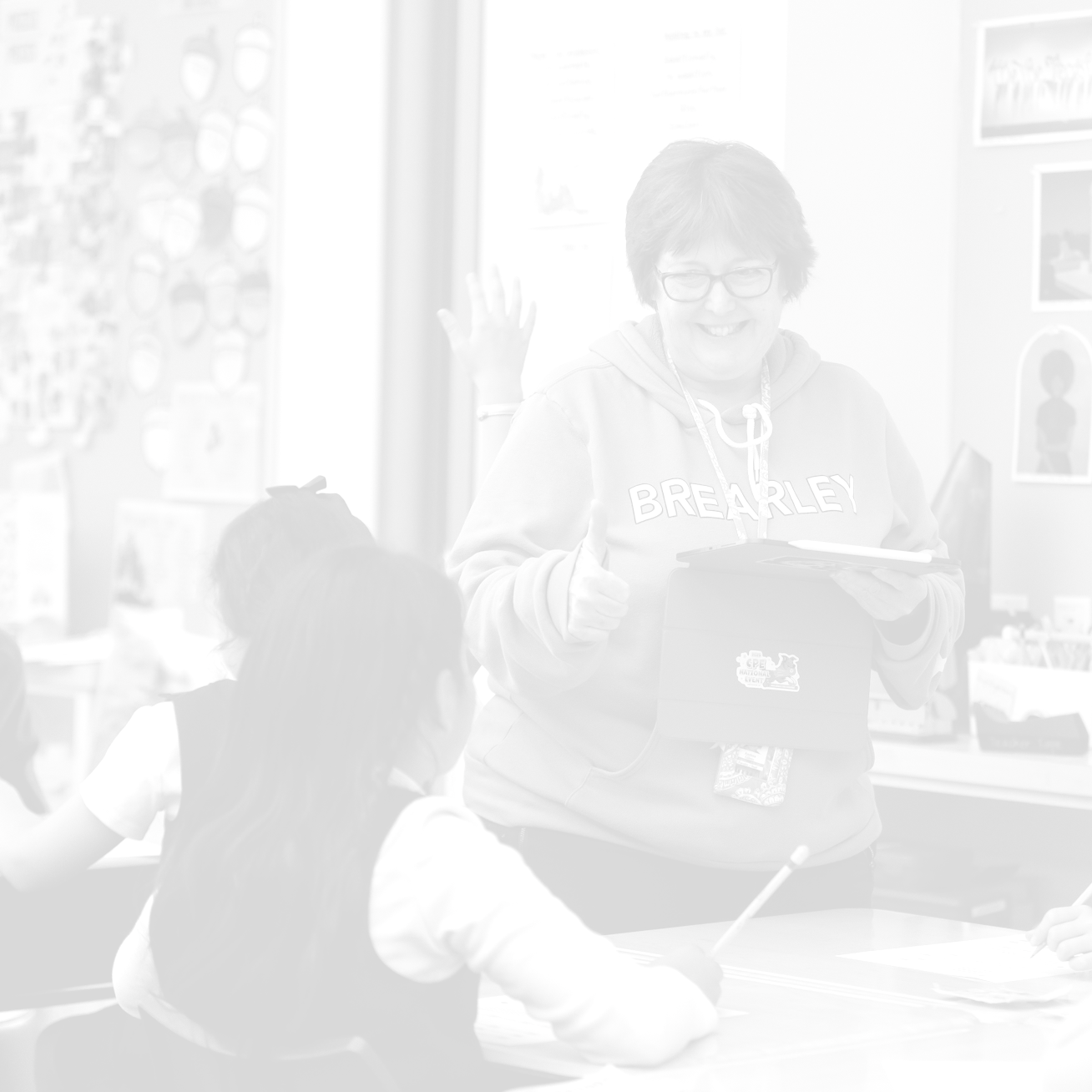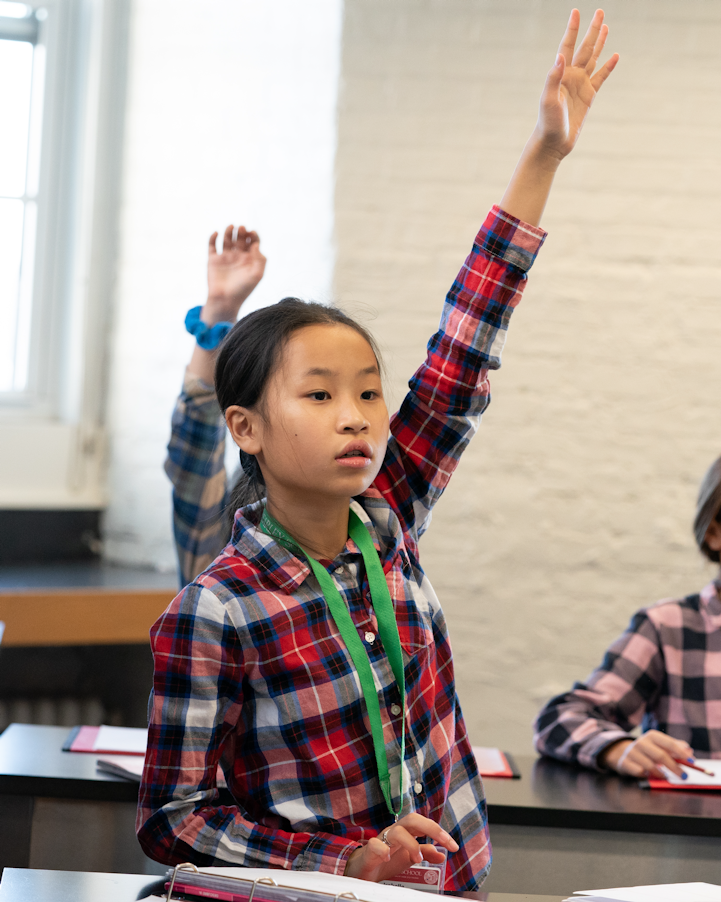
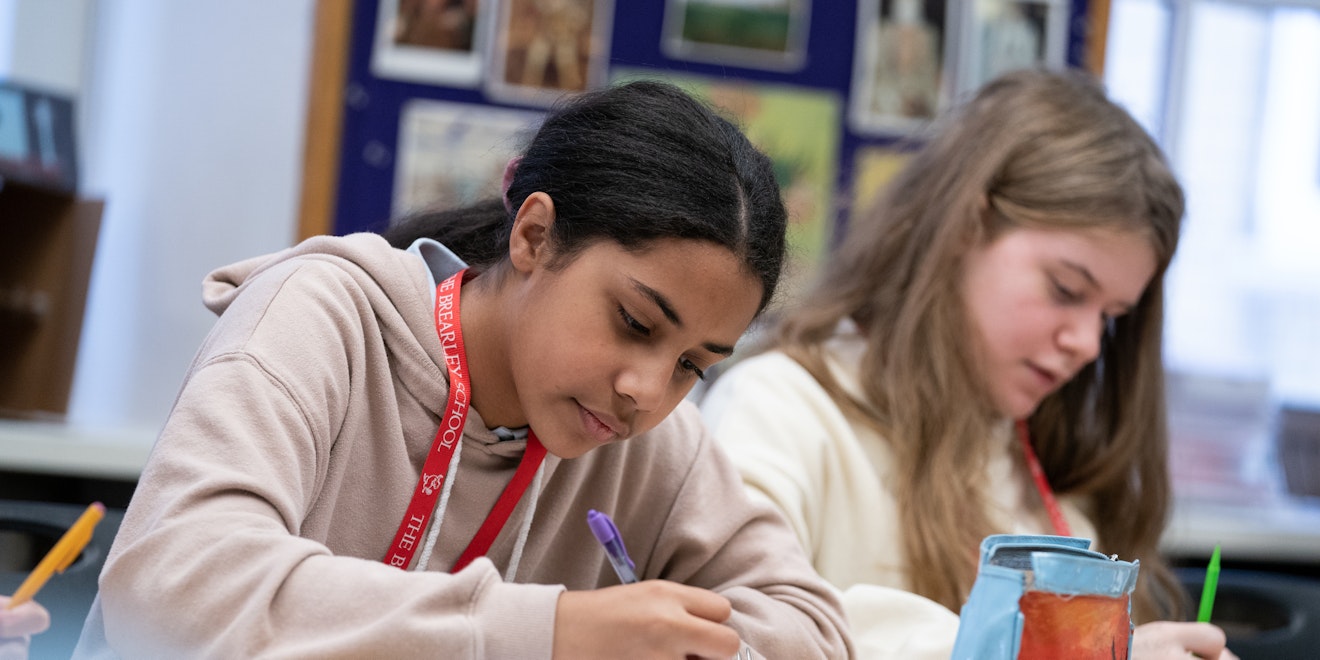
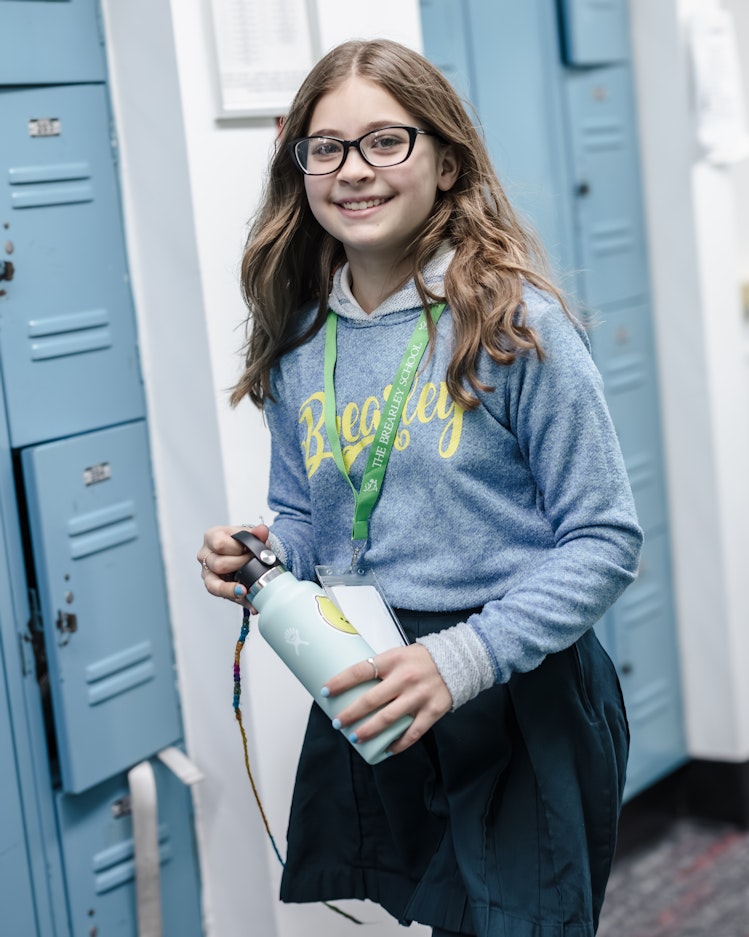
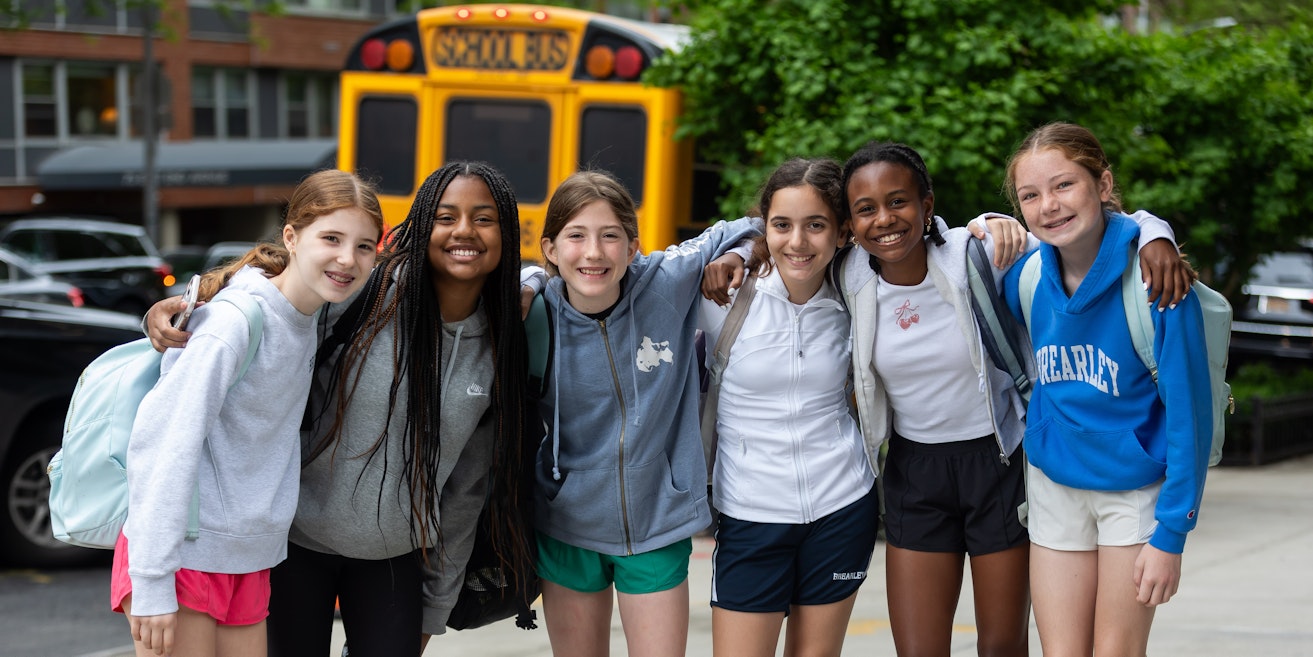
Middle School
In Middle School, our first priority is to support our students on their journey from childhood to young adulthood, with all the joys, frustrations, complexities and accomplishments that come with it. In this close-knit community, each girl is encouraged to develop a sense of her unique strengths as she masters complex new intellectual, emotional, social and physical skills.
We believe that Middle School should be a time of spontaneity and exuberance, encountering adversity and exploring avenues to overcome it. We see this period as an essential moment for guidance from cherished adults, forging lifelong connections with new and old friends, and instilling a deep and unquenchable love of learning.
Our Middle School program embraces a student’s freedom to ask questions and not always have the answer, to experience the delight of discovery through process and to challenge her own thinking and that of her peers. As our students grow, so do their responsibilities and independence, all in preparation for the challenges and demands of the Upper School.
Our program embraces a student's freedom to ask questions and not always have the answer."

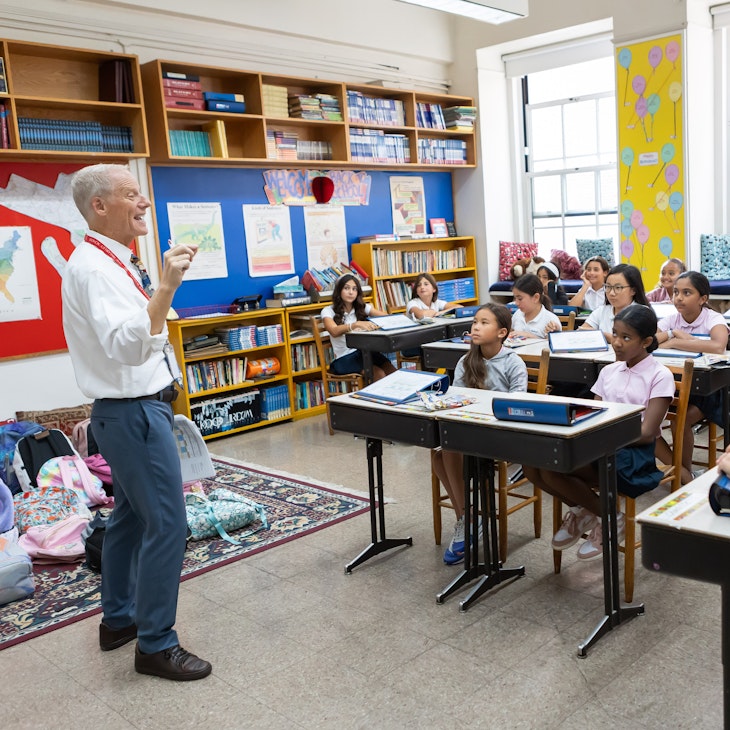
An Education for the Future, Grounded in Tradition
During Middle School, students transition from the playfulness of preadolescence to a more purposeful and scholarly life—all in a nurturing and supportive environment. Grounded firmly in the liberal arts, the curriculum is rigorous yet accessible. English classes tackle universal themes in classics like The Odyssey and Great Expectations, while developing skills in a modern language of their choice before bolstering it with Latin. Technology is also an integral part of Middle School, with computational thinking classes, including robotics or coding, required most years.
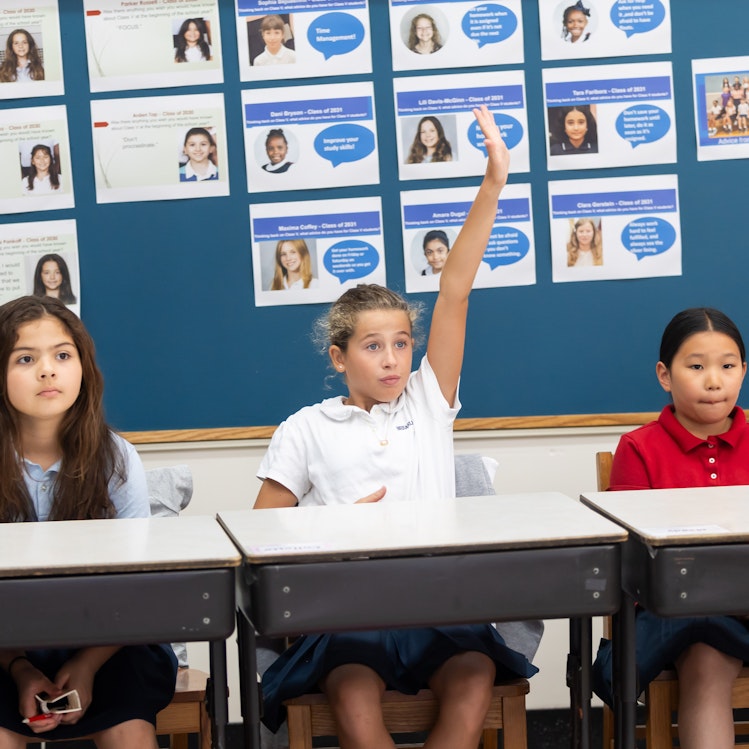
Speaking Your Mind; Finding Your Voice
Middle School is a time for students to find inner confidence, develop their own point of view and learn to express themselves in a thoughtful and respectful manner. From weekly community meetings where students present to their peers, to moments of expression through music, art and drama, to public speaking courses for all of Class VII and VIII, Middle Schoolers begin to unlock the power of their voices while learning to listen intently and purposefully to others.

Unplugging to Connect
In Middle School we choose to use technology deliberately, maximizing its benefits while minimizing the opportunities for its distractions. Students are taught how to be good digital citizens while navigating the pitfalls and promises of social media, and they are provided multiple opportunities to take a break from technology during the school day and even at home. In our widely popular Digital Fresh Start program, students pledge to put down their phones and limit their exposure to social media. Parents are given tools to support their daughters when they choose to do a digital detox, as part of a division-wide initiative on improving mental health.
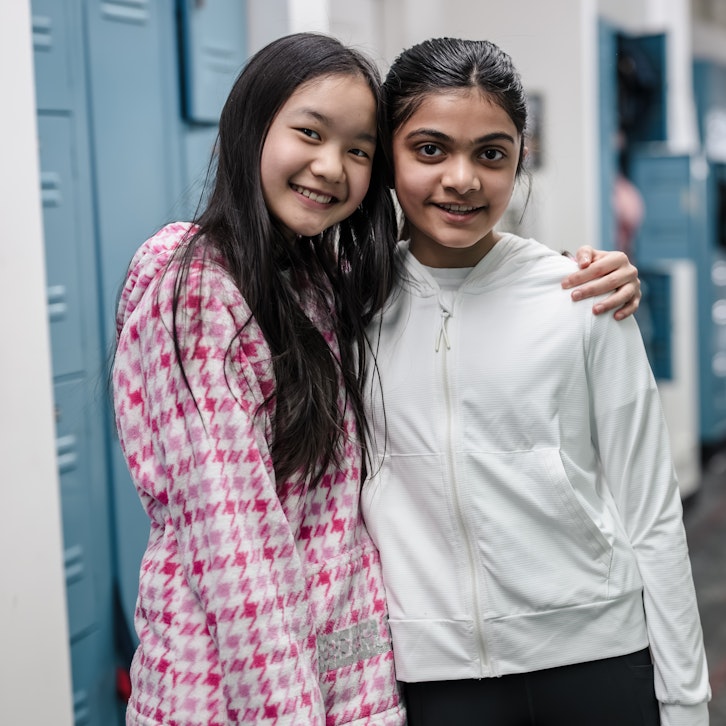
A Community Where Everyone Belongs
Middle School is a time at Brearley when students begin to develop a greater sense of their own identity while learning to value each other. They are taught to affirm and uplift each other, to listen intently and deeply, and to have respectful conversations across differences. From our numerous affinity groups and clubs, to health and wellness classes and peer-led groups, Middle School students are given abundant opportunities to grow socially and emotionally, ultimately preparing them to be part of a community of mutual concern and support.
Class V Curriculum
English
Composition, creative writing, grammar, and spelling; The Witch of Blackbird Pond, Prairie Lotus, Hurricane Dancers; short stories and poetry in connection with work in United States history.
History
The early history of the United States through 1790; related work in English; introduction to global geography.
Modern Languages
Students begin their exploration of either French or Spanish language and culture or continue with their study of Mandarin.
Modern Language ChoicesDrama
Exploration of the craft of acting through the rehearsal and performance of an adapted play by Shakespeare at an assembly in the spring .
Studio Art
Large group observational drawing sessions aimed at creating a sketchbook practice. In small groups, students rotate through the following three courses, each of which takes place over ten weeks.
Class V Art Mini-CoursesTechnology
In small groups, students rotate through the following three courses using the Snap programming language, each of which takes place over ten weeks:
Technology Mini-CoursesAthletics
Middle School Sports V–VIII is the introductory level of competitive sports at Brearley. Students have the opportunity to try different sports in a supportive, competitive environment. V/VI teams practice on Tuesdays and Fridays, 3:15–5:15 pm. VII/VIII teams practice on Mondays, Wednesdays, and Thursdays from 3:15–5:30 pm.
Mathematics
Continued development of number sense; computation with positive whole and rational numbers in both fraction and decimal forms using both mental math strategies and traditional algorithms; percentage; probability; geometry, including area, perimeter, and volume; data analysis and graphs, applications, and problem-solving.
Science
Exploration of electricity; wiring a household circuit; properties of matter; physical and chemical changes; chemical reactions; investigating gears and simple machines.
Reading and Writing Practicum
The first year of a two-year sequence for students who benefit from practice in expository writing; close reading of a variety of genres and texts; reinforcement of study skills such as outlining and note taking; researching and delivering an oral report.
Music
Singing, solfège, theory fundamentals, and group instrumental instruction in violin, viola, cello, woodwinds, horns, and percussion. All students in Classes V–VIII have the opportunity to participate in extracurricular choral, jazz, and orchestral ensembles, handbells, and a recorder concert. Students who study privately may perform in school-sponsored recitals.
Library
Development of personal reading taste through stories read aloud, pleasure reading, research skills in connection with student projects, and a study of graphic storytelling.
Physical Education
Students transition from learning fundamental movement skills to learning and applying sport-specific techniques and concepts in dynamic game play. Students continue their social-emotional growth by learning how to navigate competition, leadership, decision-making, and goal setting in a supportive environment that values sportsmanship and individual progress. By embracing both traditional and global movement practices, students gain a broader appreciation for physical activity; monthly Red/White competitions.
Health
Throughout the Middle School, lessons on nutrition, human sexuality, substance abuse prevention, safety, and peer pressure are integrated into the advisory program. School counselors teach a stand-alone series of classes that follow age-appropriate national standards for health education. In addition, students have sessions with the organization Freedom from Chemical Dependency and take self-defense classes from Krav Maga trainers.
Class VI Curriculum
English
Trickster: Native American Tales; folktales from around the world; selections from Monkey King, The Thousand and One Nights; and The Odyssey; analytical and creative writing; a class play.
History
Complex ancient societies: Egypt; the development of Judaism from Moses through Solomon; the rise and fall of the Persian Empire; Greek history through Alexander the Great; Indian history through the Mauryan Dynasty; Roman history through Augustus; Chinese history through the Han Dynasty.
Modern Languages
A continuation from Class V in the study of language and culture.
Modern Language ChoicesDrama
A collaboration with each English section to present a play dramatizing stories related to the VI English curriculum.
Studio Art
Following two years of rotation through specialized studio art experiences in a trimester system, Class VI students return to working all year with a single teacher in one studio. Long-term projects focus on building core skills in drawing, painting, and design that will serve student artists throughout Middle School. These art projects often relate to the mythologies and histories of the Ancient World encountered in the curricula of English and History.
Language
Studies in grammar and composition; public speaking; nature of language; introduction to philology through etymology and the relationship of English to other Indo-European languages.
Physical Education
Transition from learning motor skills and movement concepts to learning sport-specific skills in increasingly complex game play and performance situations; continued focus on social-emotional learning as students are exposed to the demands of competition and higher expectations for decision making, collaboration, and sportsmanship; dance and martial arts; monthly Red/White competitions.
Health
Throughout the Middle School, lessons on nutrition, human sexuality, substance abuse prevention, safety and peer pressure are integrated into the advisory program. School counselors teach a stand-alone series of classes that follow age-appropriate national standards for health education. In addition, students have sessions with the organization Freedom from Chemical Dependency and take self-defense classes from Krav Maga trainers.
Mathematics
As part of the School’s program to provide each student with appropriate individual support, from Class VI onward, students are grouped into sections designed to support their learning. Students who benefit from direct guidance by the teacher to build skills and understanding are best served in a section called VI Math, which provides more extensive scaffolding and greater opportunity for practice. Those whose skills are solid and who understand and apply new concepts readily are best served in a section called VI Math Extended, which explores the same mathematical content as the VI Math class, but with increased abstraction and more complexity. Students in both sections have the opportunity to take Calculus in Class XII.
The course covers: review of fundamental operations with whole numbers, fractions, and decimals; order of operations; negative numbers; ratios, rates, and proportions; percentage, with practical applications; area and perimeter, volume and surface area; introduction to algebraic expressions and equations.
Science
Study of the structure, function, and interdependence of the human body’s physiological systems; human health.
Reading and Writing Practicum
Second part of a two-year sequence (see Class V); further practice in writing paragraphs, essays, and creative pieces; researching and delivering an oral report; analyzing and reading complex texts.
Music
Singing, solfège, theory fundamentals, and group instrumental instruction in violin, viola, cello, woodwinds, horns, and percussion. All students in Classes V–VIII have the opportunity to participate in extracurricular choral, jazz, and orchestral ensembles, handbells, and a recorder concert. Students who study privately may perform in school-sponsored recitals.
Library
Genre study including biographies, poetry and nonfiction; research skills integrated with history classes; instruction on and practice of media literacy skills through picture books.
Technology
Mastery of Snap programming language through modeling exploration, trial-and-error problem-solving, generative and pixel art; design projects utilizing Glowforge laser cutters.
Athletics
Middle School Sports V-VIII is the introductory level of competitive sports at Brearley. Students have the opportunity to try different sports in a supportive, competitive environment. V/VI teams practice on Tuesdays and Fridays, 3:15-5:15 pm. VII/VIII teams practice on Mondays, Wednesdays and Thursdays from 3:15-5:30 pm.
Class VII Curriculum
English
Poetry, including by William Blake, Li-Young Lee, Quandra Prettyman and Elizabeth Bishop; grammar; Great Expectations; A Raisin in the Sun; formal introduction to poetic terms; analytical and creative writing.
History
World history from 200 through 1500 C. E., including the origins of Christianity and the fall of the Roman Empire; development of the Talmud and Rabbinical Judaism; the Byzantine Empire; the rise and spread of Islam in Asia to India and to sub-Saharan Africa on the Swahili Coast and in the Mali Empire; Hinduism and the spread of Buddhism to China; the Chinese Empire from Han to early Ming; China’s impact on Japan; the impacts of the Mongol conquests on Eurasia; the emergence of Europe from feudalism through the Renaissance.
Modern Languages
Students continue with their modern language study. Class VII students who are new to the school or were in Language Practicum can start French.
Modern Language ChoicesLatin
Introduction to the language and culture through reading about daily life in a first-century Roman family, combined with practice in declensions, conjugations, and elementary grammar using the Suburani Latin series.
Studio Art
Students explore the elements of design through printmaking, focusing on complex pattern development inspired by diverse historical examples. Beginning this year and continuing through all subsequent studio art classes, students complete a teacher-guided museum assignment as part of the course’s requirements.
Physical Education
Transition from learning motor skills and movement concepts to learning sport-specific skills in increasingly complex game play and performance situations; continued focus on social-emotional learning as students are exposed to the demands of competition and higher expectations for decision making, collaboration and sportsmanship; dance and martial arts; monthly Red/White competitions.
Health
Throughout the Middle School, lessons on nutrition, human sexuality, substance abuse prevention, safety and peer pressure are integrated into the advisory program. School counselors teach a stand-alone series of classes that follow age-appropriate national standards for health education. In addition, students have sessions with the organization Freedom from Chemical Dependency and take self-defense classes from Krav Maga trainers.
Mathematics
As part of the School’s program to provide each student with appropriate individual support, students are grouped into sections designed to support their learning. Students who benefit from direct guidance by the teacher to build skills and understanding are best served in a section called VII Math, which provides more extensive scaffolding and greater opportunity for practice. Those whose skills are solid and who understand and apply new concepts readily are best served in a section called VII Math Extended, which explores the same mathematical content as the VII Math class, but with increased abstraction and more complexity. Students in both sections have the opportunity to take Calculus in Class XII.
Class VII Math Section DescriptionsScience
Investigation of the nature of weather, climate change, forces, potential and kinetic energy, and Newton’s laws of motion, in the context of the laws of conservation of matter and energy. Specific topics in meteorology include heat energy, humidity, precipitation, air pressure, wind, air masses and fronts, and seasons. The course concludes with an exploration of motion, including modeling the effect of multiple variables on the bounce of a ball.
Writing Workshop
For students who do not study a modern language and who benefit from further practice in the analysis of fiction and nonfiction texts, expository writing, and the research process. This is the first year of a two-year sequence.
Music and Drama
Music and Drama collaborate to produce a jukebox musical based on the Middle School core values in the spring term. The study of music continues as it began in Class V, with the addition of percussion to the offerings in instrumental music.
Public Speaking
Lessons on practical application of public speaking skills, including storytelling without filler language and presenting with confidence.
Athletics
Middle School Sports V-VIII is the introductory level of competitive sports at Brearley. Students have the opportunity to try different sports in a supportive, competitive environment. V/VI teams practice on Tuesdays and Fridays, 3:15-5:15 pm. VII/VIII teams practice on Mondays, Wednesdays and Thursdays from 3:15-5:30 pm.
Class VIII Curriculum
English
Short stories by authors including Julia Alvarez, Toni Cade Bambara, James Baldwin, James Joyce, and Edgar Allan Poe; grammar; Maud Martha; poetry; Twelfth Night; formal introduction to narrative structure; analytical and creative writing.
History
Global history from 1500 to the late nineteenth century. Topics focus on the emergence of globalization, including the European conquest of the Americas; the Ottoman and Mughal Empires; Ming and Qing China; Tokugawa Japan; the American, French, Haitian, and Latin American Revolutions; the Industrial Revolution; nineteenth-century European imperialism; and the Meiji Restoration in Japan.
Modern Languages
A continuation from Class VII in the study of language and culture.
Modern Language ChoicesLatin
Continued study of vocabulary and syntax—with attention to uses of the participle, indirect statement and subjunctive in subordinate clauses—using the Suburani Latin series.
Studio Art
Observational drawing of the natural world, focusing on still life and the human figure, and the use of color form the fundamental core in Class VIII, with emphasis on varied painting techniques, mixed media, and layered collage. One self-guided museum study assignment is required.
Physical Education
Continuation of program begun in Class V, with the addition of one trimester of West African dance and spring electives designed by the students.
Health
Throughout the Middle School, lessons on nutrition, human sexuality, substance abuse prevention, safety and peer pressure are integrated into the advisory program. School counselors teach a stand-alone series of classes that follow age-appropriate national standards for health education. In addition, students have sessions with the organization Freedom from Chemical Dependency and take self-defense classes from Krav Maga trainers.
Mathematics
As part of the School’s program to provide each student with appropriate individual support, students are grouped into sections designed to support their learning. Students who benefit from direct guidance by the teacher to build skills and understanding are placed into a section called Algebra I, which provides more extensive scaffolding and greater opportunity for practice. Those whose skills are solid and who understand and apply new concepts readily are best served in a section called Algebra I Extended, which explores the same mathematical content as the Algebra I class, but with increased abstraction and more complexity. Students in both sections have the opportunity to take Calculus in Class XII.
Class VIII Math DescriptionsScience
Second year of a two-year physical science program on matter, energy, and the earth. Topics include an introduction to concepts of chemistry and geology, and study of the conservation and sustainable use of the Earth’s resources.
Writing Workshop
The second part of the sequence begun in Class VII; further practice in the analysis of texts, expository writing, and the principles of effective research.
Music
Singing, solfège, theory fundamentals, and group instrumental instruction in violin, viola, cello, woodwinds, horns, and percussion. All students in Classes V–VIII have the opportunity to participate in extracurricular choral, jazz, and orchestral ensembles, handbells, and a recorder concert. Students who study privately may perform in school-sponsored recitals.
Public Speaking
Introduction to formal and extemporaneous skills of public speaking, culminating in the presentation of a two-minute speech.
Athletics
Middle School Sports V-VIII is the introductory level of competitive sports at Brearley. Students have the opportunity to try different sports in a supportive, competitive environment. V/VI teams practice on Tuesdays and Fridays, 3:15-5:15 pm. VII/VIII teams practice on Mondays, Wednesdays and Thursdays from 3:15-5:30 pm.
Beyond the Classroom
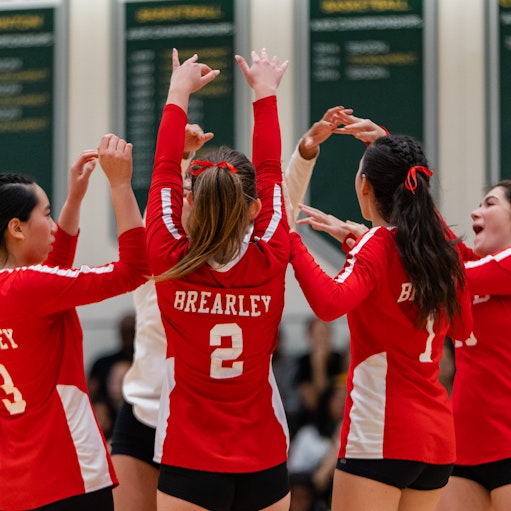
Athletics
The Brearley Athletics Program offers students in Classes V–XII the opportunity to participate in a competitive athletic environment.
Learn more about athletics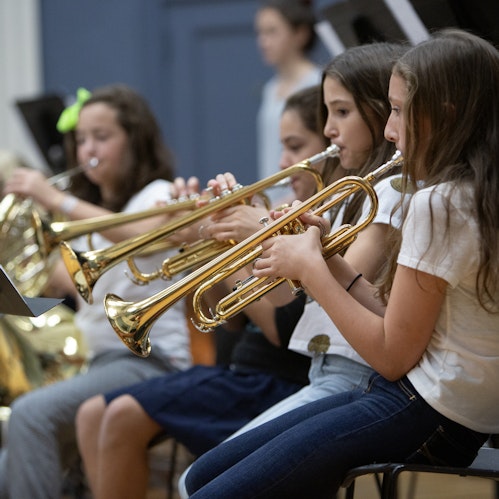
Arts
The visual and performing arts play an integral role in the curriculum and life of Brearley students.
DanceDramaMusicVisual Arts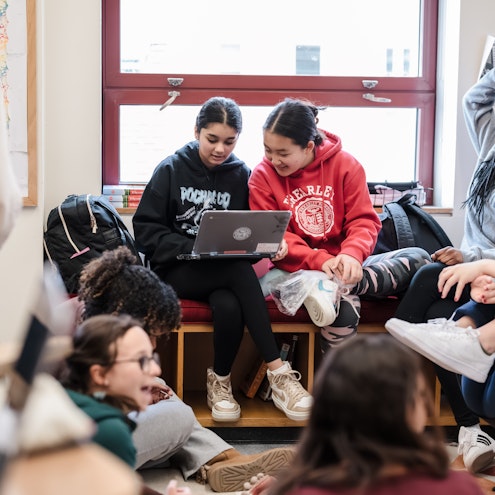
Clubs
Middle School students have multiple opportunities to explore their interests beyond the curriculum.
Learn more about clubs and activities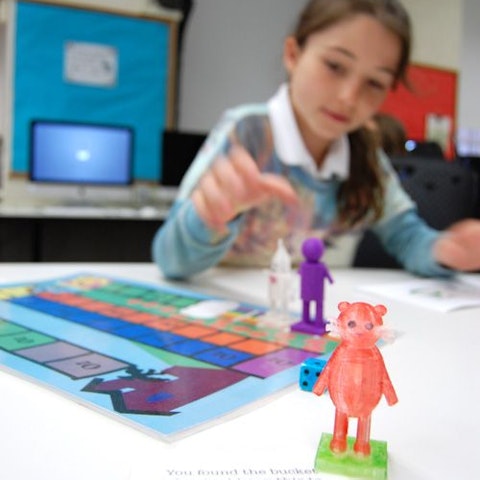
After-School Program
Brearley's after-school programs support learning for Lower and Middle School students outside the classroom.
Learn more about our after-school program